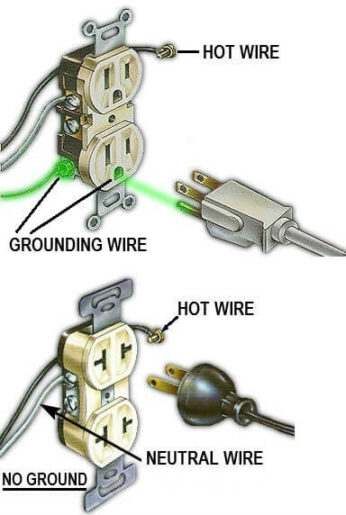
Commercial & Residential Electricians in Mesa AZ.

Commercial & Residential Electricians in Mesa AZ.
Does your home have 2 prong ungrounded outlets? You can consult with our local in-office electrician in Mesa AZ free of charge. He will answer all of your questions about electrical grounding systems opposed to ungrounded systems and provide you with the information you’re looking for. Our local Mesa electricians are available to take your call about grounding between 8:00 AM and 5:00 PM Monday thru Friday.
What is grounding an electrical system? The electrical grounding system or grounding wire in your home electrical system is by far the most important wire in the system.
Properly grounding an electrical system with no ground is vital because it adds a safety factor for you, your family, pets and all the electronic devices in your home.
Having a grounding wire, or utilizing other electrical grounding techniques, provides the path of least resistance (or route) to dispense excess electricity and transient voltages into the earth (or ground). Ungrounded systems do not have this path of least resistance. It’s also the connecting wire (or bond) between appliances and devices to ground. This is what trips circuit breakers when wiring insulation fails or malfunctions happen.

Grounding electrical systems prevents electrical injuries and damage to computers and all other electronic devices where electrical systems without grounding offer no protection.

Electrical grounding wires were seldom installed in homes built before the 1950’s. Homes built before the 1960’s used mostly 2-prong ungrounded outlets.
Here is a brief history of grounding:
If you are concerned that your home is does not have grounding, is partially grounded or has undersized ground wires; we are happy to provide you with a free electrical estimate. Our local electricians in Mesa AZ will inform you of exactly what you have and what needs to be done to provide effective grounding and make your home safe. Call today during office hours, you’ll be happy you did!

A 3-prong electrical receptacle allows a device or appliance to connect to ground through the ground prong only if a grounding wire or other method is present and connected. Simply having 3-prong outlets does not mean that you have a proper electrical grounding system.
A grounded electrical system can use one or more techniques. This can include a grounding wire, metal raceway (pipe or conduit) or armored jacket around the wires that insures a path to earth or ground. All of these grounding techniques are designed to trip the circuit breaker if a short circuit or electrical malfunction happens. All too often inexperienced handymen and homeowners install 3-prong outlets in ungrounded electrical systems that can make the system appear to have electrical grounding when it does not. In all cases, no matter what the techniques are, the electrical ground wire should be bonded from the metal box to the switch or outlet.
Homes built after 1969 may have been built with correct electrical grounding systems but mistakes made during renovations or repairs can compromise the effectiveness and path to ground, leaving it ineffective or partially ungrounded.
Dolce Electric Co schedules a local electrician Mesa AZ residents can consult with free of charge to help you evaluate the grounding and method used in your electrical system.

Grounded Wiring Systems Provide Protection That Ungrounded Systems Do Not
Electrical system grounding protects family members from electrocution and electronic devices from damage caused by transient voltages.
The electricity in your home follows the path of least resistance to ground. Let’s assume that the washing machine in your home vibrates and a live wire inside the machine comes loose and is touching the outer metal case. If your homes electrical system has no ground and you touch it you can get electrocuted. The same malfunction in a home with a grounded electrical system would result in the circuit breaker tripping and no injury could occur. In short, grounding your electrical system protects people from shocks and injuries.
Proper grounding protects you and your family from injury but did you know that a grounded wiring system also protects all of your appliances, computers, phones, televisions and even your heating and air conditioning system? Anything that utilizes sensitive electronics (printed circuit boards) is vulnerable to even small fluctuations in electricity. Ungrounded electrical systems allow small but continuous amounts of damage to electronics through static electrical charges that are not dissipated. These electrical charges build up in the insulation of your wiring and pass through your electronics instead of being safely dissipated to ground. These charges can shorten the life of the electronic components and hinder their performance resulting in expensive repairs or replacements. Upgrading to an electrical system with grounding will not repair damage that has already happened. It will prevent further damage and expense.
Most of us are aware that surge protection is recommended for use with computers and electronics. A surge protector’s function is to keep power spikes, transient voltages and surges from damaging your electronics. Surge protectors take this excessive voltage and divert it safely to ground through the grounding mechanism. But ungrounded surge protectors won’t work because there is no path to ground.
These events happen quickly, almost instantaneously.
While duration is the difference between a surge and a spike, both are increases in voltage capable of damaging your electronics. When you think of voltage, think of it as electrical pressure. Just as if you apply too much water pressure to a garden hose it will burst, too much electrical pressure (or voltage) will damage or over heat your electronic components. Even if a single surge or spike doesn’t immediately destroy your computer or appliances, it may put an extra strain on the components, shortening their life expectancy or compromising their functionality.
You probably have your computer plugged into some sort of surge protection device right now. If your home experiences a surge or spike, the surge protection is supposed to divert the excess voltage away from your equipment safely to ground. The ground wires in your electrical system are needed because if your home’s electrical wiring is ungrounded the surge protection has no route (other than through your equipment) to divert the excess voltage. This leaves your equipment unprotected. Put another way, surge protection that’s plugged into ungrounded outlets equals ungrounded surge protectors that won’t work until the electrical system is grounded.
Contact our local Mesa AZ electricians or visit us at whole house surge protectors for more information about surge protection.

Smart components are all around us. You will find them in your dish washer, refrigerator, air conditioning and heating system, clothes dryer, washing machine, microwave, telephone, televisions, computers and so on.
All of these devices and appliances are vulnerable to damage from electrical surges. If left unprotected you could be faced with an enormous replacement expense caused by just one powerful surge.
The best protection available is grounding the entire electrical system with the added technology of a whole house surge protector. This system arrests all incoming electrical surges and spikes at your main panel. It diverts them directly to ground before they ever get into your home. Whole house surge protection works in homes with ungrounded outlets and in homes that still utilize old or undersized grounding methods. They work with 100% efficiency because they connect and divert to the main grounding wire at the circuit breaker box. It protects all the devices and equipment in your home from incoming surges including those that usually go unprotected like your air conditioning system, refrigerator and pool equipment.
Dolce Electric Co schedules local electricians Mesa AZ homeowners can call for information about whole house surge protection, grounding or help evaluating your electrical system. Our local Mesa electricians are available to take you call from 8:00 AM and 5:00 PM, Monday thru Friday.
Related Services
Dolce Electric Co
625 W Southern Ave E239,
Mesa, AZ
85210
Mon – Fri 8:00AM to 5:00PM
Sat – Sun: 8:00AM to 3:00PM